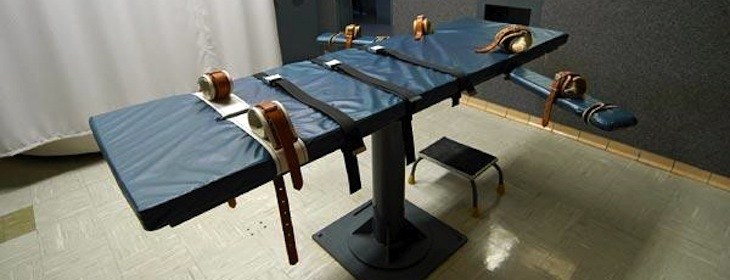Gov. Hutchinson reviewing planned executions; says no economic effect
by April 3, 2017 6:45 pm 492 views

Gov. Asa Hutchinson said he is reviewing the cases of each of the eight men the state plans to execute over 11 days from April 17-27 and said he doesn’t believe the resulting publicity will hurt the state economically.
“I’m taking those one at a time to make sure that each one of them gets the individual attention that is appropriate,” he said in a press conference Monday. “As we focus on each individual person that has a death sentence, we also want to be reminded as we go through that process of the victims, and the crimes that occurred, and so we want to balance the conversation during that time.”
Hutchinson said he met with his staff today to considers the timelines for his reviews of each individual case. A report from the Harvard Law School’s Fair Punishment Project concludes that Gov. Hutchinson should halt the eight executions set for April so that “legal deficiencies” in the trials of the eight men can be reviewed and to “preserve public confidence in the rule of law.”
Asked if he could still grant clemency in any of the cases, he said, “As you know, these cases have all been through over 10 to 15 years of review in the courts. There’s not really any question of guilt in these cases, and the significance and horrendous nature of the crimes are the reasons the jury gave that penalty. And so that means a lot to me as I go through the review, but each one should be reviewed individually. I will look at the recommendations from the Parole Board and make a decision from there.”
Hutchinson in February scheduled the eight inmates to be put to death, all for capital murder, on the following dates.
April 17, Don Davis, Bruce Ward
April 20, Stacey Johnson, Ledelle Lee
April 24, Marcel Williams, Jack Jones
April 27, Jason McGehee, Kenneth Williams
The last time Arkansas carried out an execution was in 2005, when Eric Nance was executed for the rape and murder of Julie Heath of Malvern. Since then, the state’s execution schedule has been interrupted by legal challenges and problems obtaining the drugs needed for the procedure. One of the three drugs, midazolam, expires April 30. Thirty-four men are on death row.
Arkansas’ plan to carry out eight executions in 11 days has drawn national and international media attention. Hutchinson said he had asked his staff to review recent death penalty cases. According to the Death Penalty Information Center, a nonprofit that opposes the death penalty, there have been 444 executions nationwide in the years since Arkansas’ last in 2005. Texas has executed 187 starting in 2006, while Florida has executed 32 and South Carolina has executed eight.
Hutchinson argued that those states’ economies have not been harmed by their application of the death penalty.
“I expect absolutely no economic consequence because when you look at South Carolina, Florida and Texas, those economies have not suffered consequences either from Europe or otherwise, or international scrutiny because of the actions they’ve taken,” he said. “And since we have taken a decade extra long to review these cases and make sure due process was meted out, then I don’t think there should be any extraordinary consequences or criticism based upon the judgment of the juries that have been made in these cases.”
Acknowledging the attention the state’ schedule has produced, Hutchinson said he plans to answer questions in one media session, but “it will not be a constant flow of media engagement on this next month in terms of the executions that are set.”
(Link here for a history of Arkansas executions since 1913, when the capital punishment process became a state obligation.)
